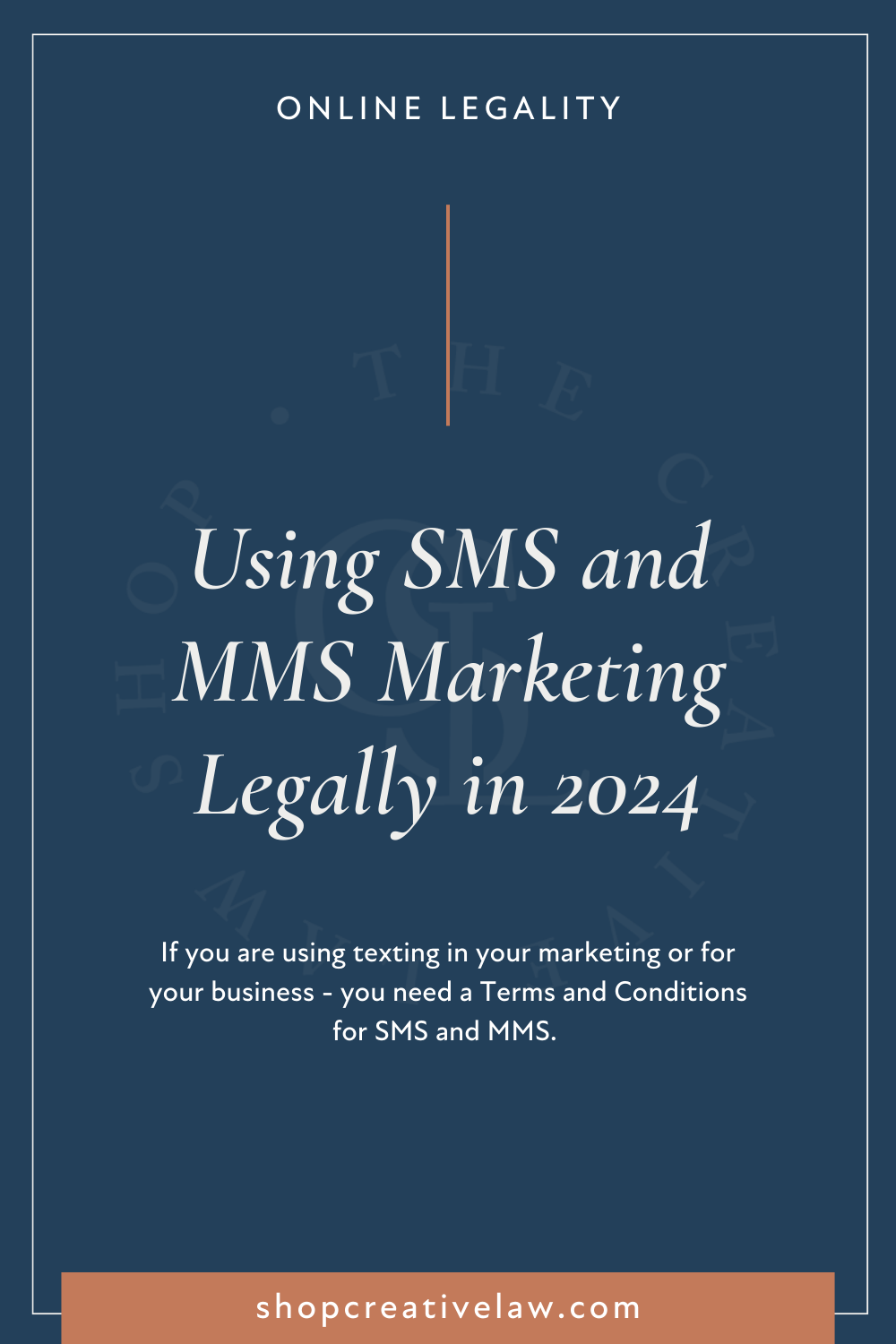Using SMS and MMS Marketing Legally in 2024: A Guide for Online Businesses
If you are using SMS or MMS (texting) in your marketing or for your business - you need a Terms and Conditions for SMS and MMS.
If you’ve signed up for a freebie, discount or newsletter recently, you’ve probably been asked for your phone number in addition to your name and email. More and more businesses are leaning into SMS marketing - and for good reason.
Texting is one of the top ways we communicate with each other. Texts are often checked before emails - so when it comes to using them for business, texting offers unparalleled immediacy in customer engagement.
As SMS marketing continues to gain popularity and evolve, it's accompanied by new laws and regulations intended to safeguard both businesses and consumers.
After reading this post, you’ll walk away knowing the essential legal considerations for implementing an SMS marketing strategy that respects both the law and your audience.
Let’s start with the basics.
What’s the difference between SMS and MMS?
SMS refers to a basic text message of 160 characters or less. SMS does not include emojis or attachments.
A text becomes MMS when its longer than 160 characters or includes an attachment, such as an emoji, website link, pictures or videos.
For the rest of this post, we’ll just refer to both as SMS.
Telephone Consumer Protection Act (TCPA): the law regulating SMS Marketing
At the heart of SMS marketing legality in the United States is the Telephone Consumer Protection Act (TCPA). Established by Congress in 1991 and enforced by the Federal Communications Commission (FCC). The TCPA was designed to protect consumers from unsolicited calls and messages, casting a wide regulatory net that includes marketing calls, faxes, and text messages. (Interestingly, emails are an exception.)
For creative entrepreneurs, a basic understanding of the TCPA is important for legal compliance and for maintaining the trust of your audience.
Who is required to comply with TCPA Requirements?
The TCPA's regulations apply to individuals, businesses, and carriers engaging in SMS marketing within the United States. It's important to note that these rules also apply when the recipient is in the United States, regardless of the sender's location.
How to comply with TCPA requirement
Achieving compliance with the TCPA involves two key actions: obtaining consumer consent and providing clear disclosure.
Obtaining Consumer Consent
Before launching your SMS marketing campaigns, ensure you have explicit written consent from your customers. This consent should be clearly documented and easily accessible for future reference. Here are some methods to secure consent:
Obtain clear consent through online forms, checkboxes, or keyword texting.
Send a comprehensive opt-in message that outlines your business name, the purpose of the message, frequency, potential charges, and opt-out instructions.
At the point of collecting phone numbers for marketing, include an explicit agreement to your "SMS Marketing Terms and Conditions," which should also be accessible from your website's footer. This can be a checkbox saying “I agree to the SMS Terms and Conditions” with your terms hyperlinked.
Providing Disclosure
Make your SMS terms and conditions easily accessible to subscribers to remind them of their subscription details. Add a link to these terms in your initial message and keep them in the loop if things change. Transparency is key.
We recommend making your Terms and Conditions of SMS easily accessible by linking it in the footer of your website. It can be added to your Privacy Policy and Terms and Conditions page, as long as it clearly states “SMS MARKETING TERMS AND CONDITIONS”.
Navigating TCPA Violations, Penalties, and Solutions
Here’s the deal: Violating federal laws related to text messaging can result in hefty fines ranging from $500 to $1,500 per text message per recipient. And most businesses’ insurance won’t cover these costs, nor help with legal fees.
To make matters worse, the TCPA allows for class-action lawsuits, potentially alleging millions of violations, which could lead to astronomical penalties. Businesses have ended up paying hundreds of thousands or even millions to settle these cases.
We don’t say this to scare you, but so you know why it’s important to protect your business with a Terms and Conditions for SMS and MMS.
One provision to include in your T&C of SMS is a Class Action Waiver. This proactive measure can protect your business and allow you to engage in SMS marketing with confidence.
This provision is included in our Terms and Conditions for SMS and MMS marketing.
Online marketing legality, especially within the realm of SMS, may initially seem daunting. Nonetheless, remember compliance is your best friend!



